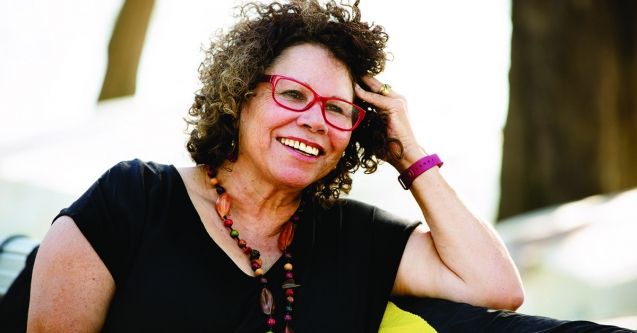Sue's story: Shining the light of hope
4 March 2021

Sue, a Wiradjuri woman from Wellington NSW, serves as an Aboriginal and Torres Strait Islander Engagement Coordinator for The Salvation Army in Australia based in the NSW/ACT Division. She is actively involved in the rollout of The Salvation Army’s Cultural Competency and Capability Framework which includes the national Reconciliation Action Plan (RAP).
For Sue, the message at the heart of Easter is hope and light, even when times seem darkest. There was a time in her life when all Sue could feel was dark heaviness.
Sue’s dad and mum passed away in 1981 and 1983, respectively. She also lost her three brothers, each in tragic circumstances, between 1989 and 2009.
“I was a lost soul after my last brother died,” Sue says. “I would say there was a genuine darkness over me.
“I was unhappy, depressed and nothing I could ever do, or anyone else could do, would ever make me feel happy. I felt lost, isolated and angry at that time, and that life had dealt me such a bad hand.
Sue has many happy childhood memories, but as she grew older, she began to see more clearly the scars of dispossession, racism and loss, and the tragic impact it had on her family members, especially each of her brothers.
Sue remembers cousins and other family members suddenly going missing, only to find out as an adult that they had been taken by the government “welfare”.
“I remember the racism,” she shares. “My brothers and I were enrolled in the local public school, but weren’t allowed to speak Wiradjuri, share that we hunted traditional food, like goanna and kangaroo, or help dad make Aboriginal tools and such, otherwise known as 'artefacts'.
“Our families told us not to talk about our culture at school – they were worried we would be taken away. We lived in a white world at school, just to survive, but an Aboriginal world at home.”
Sue also later discovered that her mum (who died when Sue was only 20) had been part of the Stolen Generations.
“I do remember my mother, God rest her soul, saying that she was a Ward of the State and couldn’t go home until she was 21,” she says. “But only recently did I learn what that really meant. Mum and her siblings were taken and put into care after mum’s mum, Nan, was hit by a car.
“I was in shock when I discovered this, but it explained a lot too. Putting the pieces of this family puzzle together helped me to see what our people had been through and why they were struggling.”
Light of hope
In 2009, Sue went to a Kairos (prison ministry) weekend. She had grown up with Christian belief in her family but did not have an active faith at the time.
She explains: “I went (to Kairos) as a guest because I’d supported a brother in prison. All weekend I heard from these beautiful women telling me about their experiences and every time someone talked to me, every time I heard a message, I would feel a little bit more of the darkness leave.”
At the end of the weekend, Sue committed her life to following Jesus.
“I cried and I cried,” she says. “I felt like I cried all these tears and washed all this sin away and sadness away.
“I came through that and it was like this light just shone on me. It was absolutely amazing, and I can still feel it now – real hope and joy.”
Then, in 2015, her cousin Jason invited Sue to come with him to the local Salvation Army. Sue loved it and soon she, husband Michael and, periodically, their grandchildren were attending and involved.
At around the same time, Sue attended a chapel service at The Salvation Army Dooralong Transformation Centre (addiction recovery service) on the NSW Central Coast.
“As I watched the graduations at chapel, I was overwhelmed with emotion,” she says. “These people’s lives had been transformed. If only I had known about this place, and my brothers did, they might still be alive. Attending chapel that night gave me even more hope.
Working for reconciliation and understanding
Sue has passionately worked for The Salvation Army since 2017, believing faith, an active community and holistic and effective programs can transform and rebuild lives.
She is passionate about reconciliation between Indigenous and non-Indigenous peoples. She is also focussed on the desperate need for support and healing for those who are struggling, particularly those in prison and those supporting them. She is saddened by the fact that Aboriginal and Torres Strait Islander peoples make up 28 per cent of those incarcerated, despite being only three per cent of the general population.
Sue feels very positive about her role, saying: “The Salvation Army has been awesome in wanting to listen and change their way of doing business, to being more inclusive.
“Together we have developed the Cultural Competency and Capability Framework. We have the Employment and Retention standards, a Cultural Learning Standard and much more. This is all about working to transform attitudes and building cultural safety.”
Sue believes her faith and her church community enriches her work and life.
She says: “Like Jesus gave me, I want to role model to others another way of doing life, a way that will help us reach our full potential as God intended.
“When I think about Easter, I mourn for the pain Jesus Christ our Saviour experienced on the cross, but I am so thankful God has bought light into my life – my whole self.
“Every aspect of my life is better for it, and I want to share that with others.”
*Portions of this article first appeared in Others.org.au, written by Simone Worthing